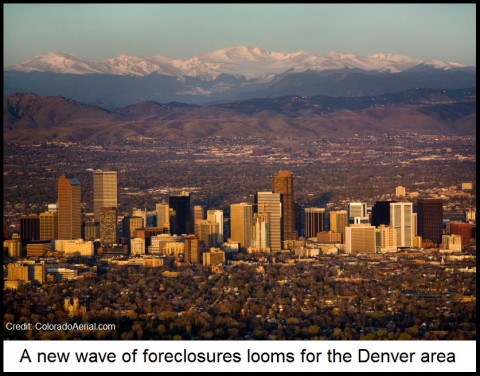As the Great Recession drags on, albeit without official sanction, each and every silver cloud of economic news continues to harbor a dark lining. Most recently, amidst the mainstream media’s hubris over a supposedly stabilizing housing market, we read yesterday in the Denver Post that the region is bracing for yet another painful round of foreclosures. “Despite reports of a thawing housing market,” the paper noted in a front-page article, “yet another wave of foreclosure appears to be looming.” The fact that lenders are gearing up for this is apparent in the sharp spike in deed-of-trust assignments in Colorado. Compared to 2011, they’ve more than doubled in the first five months of this year. Deeds of trust convey ownership rights of mortgages and the ability to foreclose on them, and they are therefore a reliable indicator of foreclosure activity to come. According to the Post, if only half of the filings become actual foreclosure cases, foreclosures could spike to 2007’s crisis levels.
We have long predicted that home prices would eventually fall by at least 70% as debt deflation ran its course globally. This would imply that, despite the unprecedented drop in residential real estate values since 2007, residential values in the U.S. are only halfway to a bottom. Meanwhile, spotty signs of recovery in the housing market have caused the news media to hallucinate about the return of good times, In Las Vegas, for one, home prices have fallen to levels so low that even real-estate pessimists would have to concede that there are great bargains to be had: three-bedroom homes with swimming pools for $100,000, according to a friend of ours who lives in such a home herself. She paid $325,000 for it, though, and although Nevada’s underpriced housing will be a long-term plus for the local economy, it is unlikely to reverse the equity loss suffered by my friend, nor her despondence over having lost so large a piece of her retirement nest egg to debt deflation.
Gusher of Latino Cash
Miami real estate is recovering as well due to a gusher of hot money from Latin America. The city is probably better positioned than Las Vegas to benefit from this infusion over the long-term, but condo prices are approaching frothy levels that could create another bust. And in New York City, where Russian tycoons will not be outbid for penthouses, the $100 million apartment seems likely to become yesterday’s news before the inevitable bust arrives. Meanwhile, Denver’s real estate market never got overheated to begin with, since the city’s recovery from the oil-patch bust of the late 1980s was gradual. For medium-to-large U.S. cities, the sluggish state of Denver’s economy probably falls near the middle of the boom-bust spectrum, somewhere between the Rust Belt and New York/Boston.
And that is why a wave of foreclosures here would be bad news for other cities whose economies have been merely muddling along. Despite this, the mainstream media have taken an activist role in promoting the illusion of a housing recovery. A front-page story in the Wall Street Journal yesterday offered statistics from Zillow to support a picture of spotty recovery in real estate prices across the U.S. But guess which city was near the top of the list, with home values rising over the previous three months in more than 90% of zip code neighborhoods? Answer: Denver. Considering what was being reported in the Denver Post on the same day (see above), we should take the Wall Street Journal’s good news with a grain of salt. As Denver goes, so goes the nation? It’s a possibility worth considering as the mainstream media continues to obsess over a recovery that isn’t — and never was.
***
(If you’d like to have Rick’s Picks commentary delivered free each day to your e-mail box, click here.)


Although it’s too early to rejoice that the housing market crisis is over, there’s also a lot of good news. Home prices are starting to go back up, there are more contracts for new homes, including in the Denver area, and inventory is starting to drop, and not because banks are artificially trying to make it so like the last couple of years. At some point foreclosures have to slow down because so many people have already foreclosed so even if another round is coming, it couldn’t possibly be as high as it already has been.